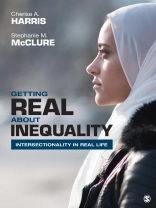Getting Real About Inequality is a contributed reader for undergraduate courses in Race/Class/Gender, Social Inequality, or the Social Construction of Difference and Inequality. It gives instructors in these courses a set of materials to help them moderate civil, productive, and social science-based discussions with their students about social statuses and identities. Like the book it is modeled after,
Getting Real About Race, it is organized around myths and stereotypes that students might already believe or be familiar with through the media or popular culture. A panel of expert contributors were enlisted to write short, accessible essays address the same questions (What is the myth or stereotype under investigation? How do we know that the myth or stereotype is widespread? What does the empirical data tell us?) and provide the same pedagogical features (a summary of the research data, discussion questions, suggestions for further study, suggested activities and assignments). All of pieces in the book employ an intersectional perspective, to help students see the nuanced mechanisms of power and inequality that are often lost in everyday discourse.
Mục lục
“But Aren’t Some Groups Actually More Oppressed Than Others?”: How and Why Intersectionality Matters – Cherise A. Harris and Stephanie M. Mc Clure
“A Family is Two Parents, Their Children, and the White Picket Fence”: The Impact of Invisible Intersections on How We Talk About “The Family” – Stephanie Medley-Rath
“School Choice Ensures Kids Get the Best Education”: The Realities of Charter and Magnet Schools for Children in the Intersections – Tomeka Davis and Dionne Parris
‘Maybe Some People Shouldn′t Be Parents’: The Hidden Inequalities of the Child Welfare System – Cherise A. Harris
“Why Should We Have to Pay for Anchor Babies and Welfare Queens?”: How Political Rhetoric Influences Social Policy Toward Black and Latina Women – Carly Hayden Foster
“But Aren’t the Poor Mostly Inner-City Blacks?”: Understanding Poverty from an Intersectional Perspective – James M. Thomas, Paige Overmyer, and Stephanie M. Mc Clure
“Everyone Gets the Same 24 Hours a Day”: An Intersectional Approach to Understanding the Time and Life Lost For Black Men and Boys – David C. Turner III, Uriel Serrano, and Freeden Blume Ouer
“The Police Are Here to Protect Us”: The Role of Race and Gender in the Construction of Law Enforcement – Jennifer Carlson
“Unwanted Pregnancies are Completely Preventable”: Understanding Reproductive Freedom in the Context of the Intersections – Ocqua Gerlyn Murrell
“Since We All Breathe the Same Air, The Environment Affects Us All in the Same Way”: An Intersectional View of the Impact of Environmental Toxins – Julia A. Flagg
“Lizzo Should Really Be Embarrassed to Show that Much of Her Body”: Applying an Intersectional Lens to the Scrutiny of Black Women’s Bodies – Sabrina Strings
“If Only He Looked More Like a Woman”: How the Intersections Affect the Experiences of and Attitudes Toward Transgender People – Kylan Mattias de Vries and Carey Jean Sojka
“Muslim Women Covering Themselves is Oppressive”: Hijabs, Burkas, and Niquabs Through an Intersectional Lens – Afshan Jafar
‘I Keep ′Em Around Just in Case’: Understanding Gun Ownership in the United States from an Intersectional Perspective – Levi Gahman
“I’m a Feminist, So That Means I Am for ALL Women”: The Role of Intersectionality in “Sisterhood” – Andrea N. Baldwin
“Why is There a Black Twitter and a Gay Twitter?” The Role Social Media Play in Making Categories of Difference Visible – Latoya Lee
“I Just Think Asian Men Aren′t Sexy!”: Race, Class, Gender, Sexuality, and the Devaluing of Asian Men – Karen Wu
“When I Think of Disability I Think of a White Guy in a Wheelchair”: The Social Construction of Disability and its Intersections with Race, Class, Gender, and Sexuality – Jennifer Domino Rudolph
“Why Do White Women Vote Against Their Own Interests?”: Unpacking Race, Gender, and Sexuality in the 2016 Presidential Election – Dara Z. Strolovitch, Janelle S. Wong, and Andrew Proctor
“Things Will Get Better Over Time. Besides, What Can I Do?’: Coalition-Building Across Categories of Difference – Cherise A. Harris, Andrea N. Baldwin, and Stephanie M. Mc Clure
Giới thiệu về tác giả
Stephanie M. Mc Clure is a professor of sociology at Georgia College. She teaches classes on racial stratification, social theory, and the sociology of education. Her research interests are in the area of higher education, with a focus on college student persistence and retention across race, class, and gender, and a special emphasis on postcollege student experiences that increase student social and academic integration. She has published in the Journal of Higher Education, Symbolic Interaction, and The Journal of African American Studies.












